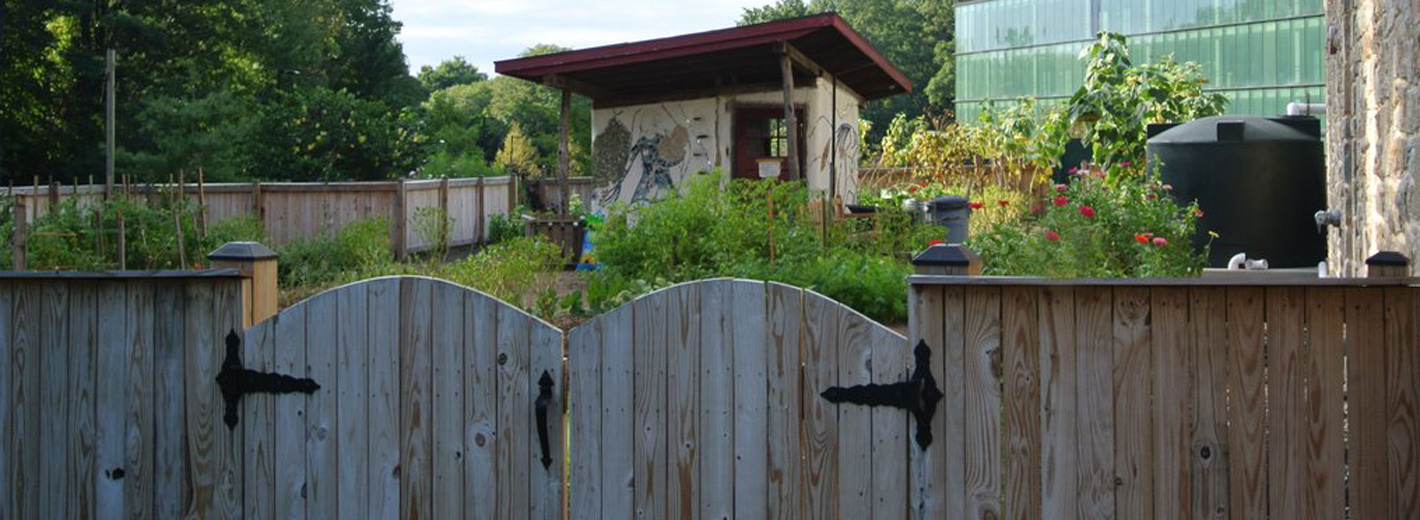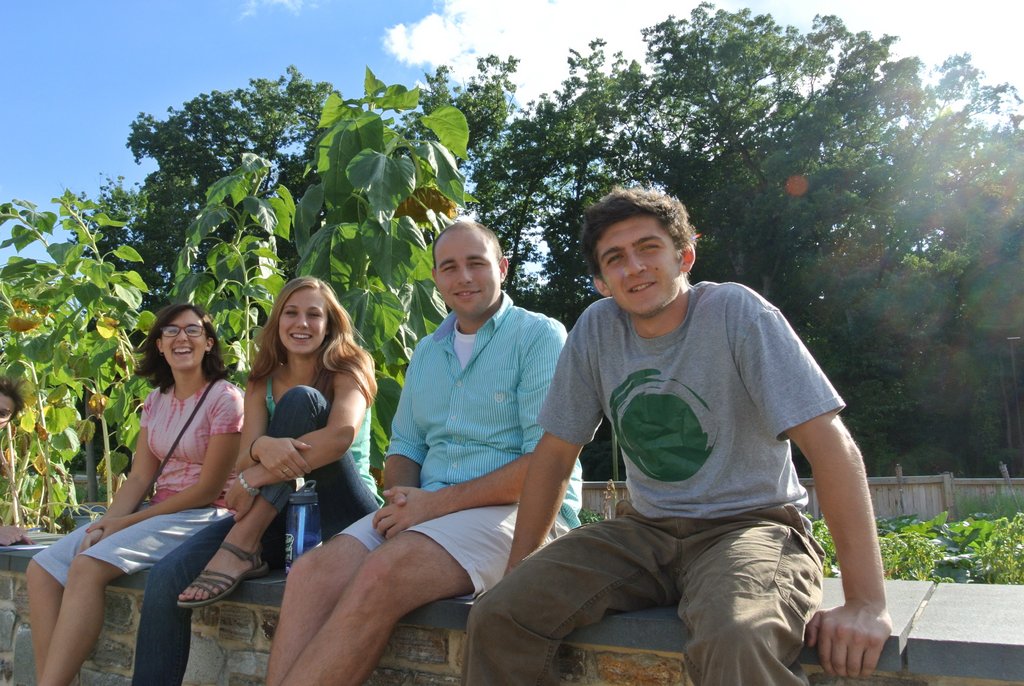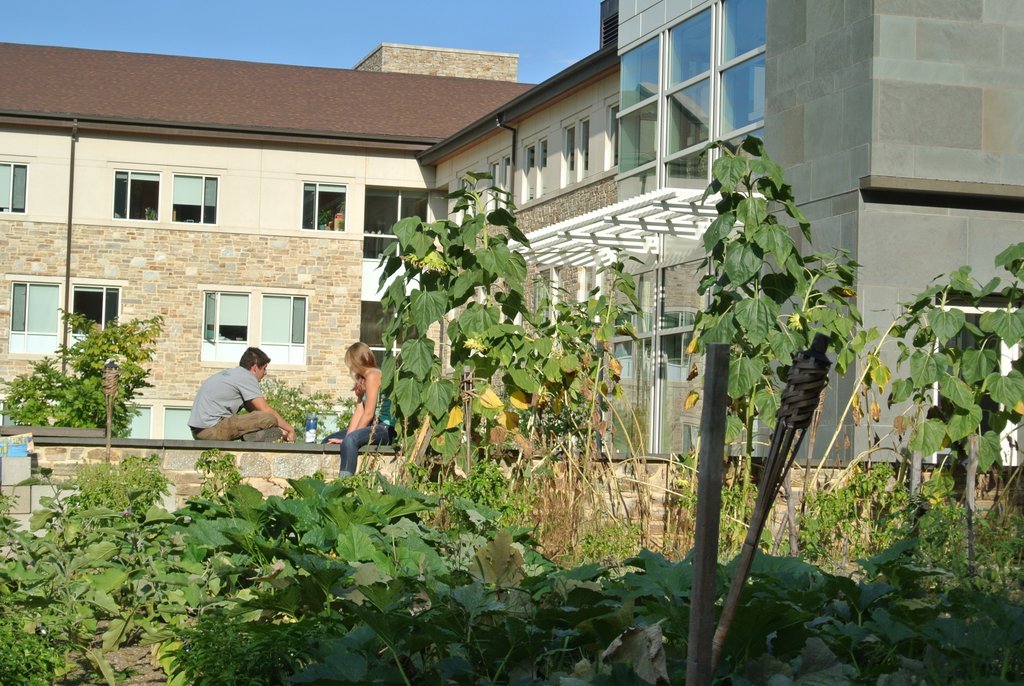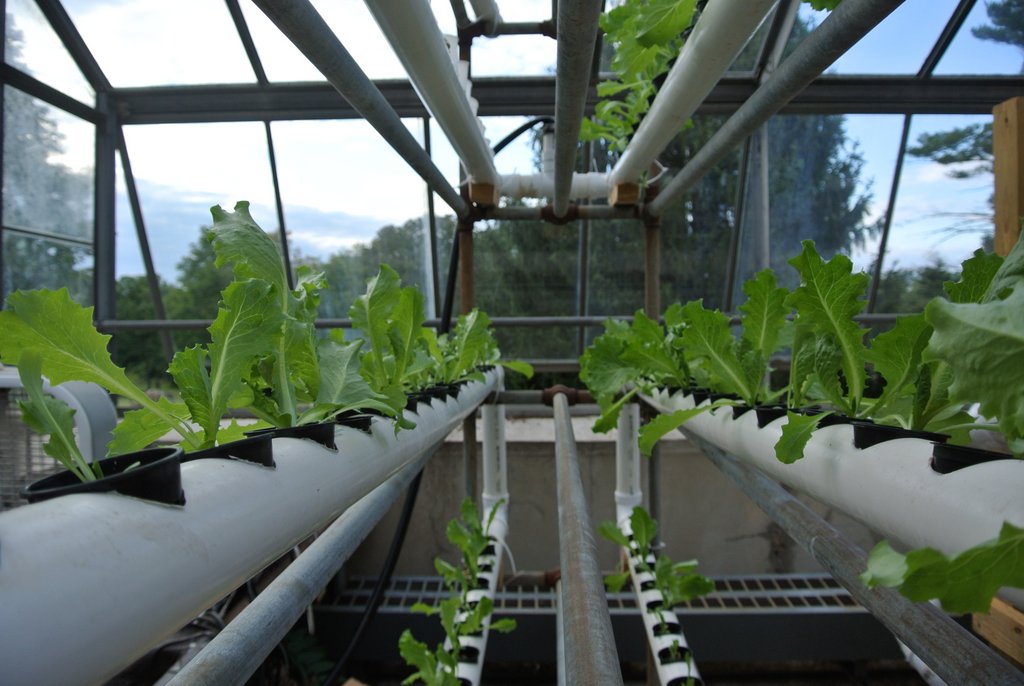
Lessons from Goucher College’s Ag Co-op Farm
“I have never let my schooling interfere with my education,” wrote Mark Twain famously.
Those words echoed through my mind as five enthusiastic Goucher College students toured me through their campus garden not too long ago. A campus farm is surely an untraditional learning environment, but one with interdisciplinary lessons between every pepper plant and blueberry bush. In contrast to most campus farms, which are far off the beaten path, the Goucher Agriculture Co-op student garden group’s space is smack in the middle of campus. From where I stood, I watched classes end and students come streaming out of buildings, talking with friends and basking in the beautiful, sunny day. Approaching the garden, I could see sunflowers drooped over, their heads falling (and turning into harvestable seeds) and their leaves big, green and welcoming.

Goucher Ag Co-op leaders Katrina Kniss (’16), Todd Troester (’15), Maren Stunes (’16) and Max Heller (’16).
Over the last three years, I’ve watched as this garden blossomed from a few raised beds into one of my favorite campus gardens under the guidance of a few devoted leaders: Todd Troester (’15), Maren Stunes (’16), Katrina Kniss (’16), Max Heller (’16), and Erin Snyder (’16). Through the hard work of those students (and perhaps helped along by its central location), the Goucher Ag Co-op has grown both in size and participation over the last three years. Now, more than 30 students help tend to the groups’ 5,000-square-foot garden and hydroponic greenhouse. They became one of Bon Appétit’s Farm to Fork vendors, selling their produce to their chefs on campus, and Todd proudly participates on the Campus Farmers Network Advisory Board.
In this untraditional learning environment, students are using what they learn in classes and much more to uncover some secrets to successful (sustainable, even!) campus farming.
Enjoy the present but plan for the future: One of the unique challenges that campus farms and gardens face is frequent turnover. A lot is learned over the course of a calendar year, and just as students learn the ropes and start to excel, they graduate or study abroad and new students with varying levels of knowledge take their place. Goucher students do an incredible job addressing the challenge of student turnover by setting up systems that last.
Todd Troester (’15) is a senior majoring in Environmental Science and the President of the Ag Co-op. As a junior, Todd had the foresight to start planning for a time he wouldn’t be around. He created a new leadership structure, and got a grant from the college for four students to live on campus over the summer to work. In the time outside of their (other) summer jobs, they each spent 2 hours a day learning the ways of the garden, and 2 hours a week on a local farm learning about agriculture. Now, as Todd prepares to graduate, he is leaving the Ag Co-op safely in the hands of four knowledgeable and prepared sophomores.
Use resources wisely: In the news and in their classrooms, students have learned about crippling drought and clean water crises. In their garden, they designed a system to utilize fresh water efficiently over time. The students built a catchment system that catches rainwater from the roof of Welch Residence Hall and feeds into a drip irrigation system that waters the garden. They secured funding on campus to purchase two 1,000-gallon tanks, in order to use one of our most precious natural resources (water!) wisely.
 Get creative: The campus garden is located in a wind tunnel, which hampered students’ ability to grow many crops. Instead of building taller fences or walls, students took advantage of a quick-growing, pollinator-attracting plant to block the wind: sunflowers. They planted sunflowers around the perimeter to serve as a wind block, and, of course, to admire each day.
Get creative: The campus garden is located in a wind tunnel, which hampered students’ ability to grow many crops. Instead of building taller fences or walls, students took advantage of a quick-growing, pollinator-attracting plant to block the wind: sunflowers. They planted sunflowers around the perimeter to serve as a wind block, and, of course, to admire each day.
Plan for more than you can imagine: The Ag Co-op found a greenhouse on campus with extra space. Over the last two years, Todd worked with Dr. Gina Shamshak, an Assistant Professor of Economics, to gain access to the space, and then design and build a custom hydroponic system. The system is a closed-loop and recirculating one, which means no water pollution and no excess nutrients. With minimal work, the students are able to grow 75 heads of lettuce at a time to sell to their Bon Appétit chefs on campus.

Their self designed and built hydroponic system grows 75 heads of lettuce at a time, which are sold to their Bon Appetit chefs.
But they didn’t stop there. They created the hydroponic system with two parallel (identical but separate) halves so that they could tweak small variables, like the ph and nutrient levels, and watch the effects on the lettuce. Right now, they focus on growing the lettuce, but in the future they hope that a student will do a research project using the parallel systems. The Goucher Ag-Coop learned a lot from building and using that hydroponic system — but just as importantly, they built it so that others could learn lessons in the future that they haven’t imagined yet.
That’s reassuring to me. Because if there’s one thing I know, it’s that we all have a lot to learn about how to make the future of food more sustainable. For now, I can’t wait to see what next September brings.